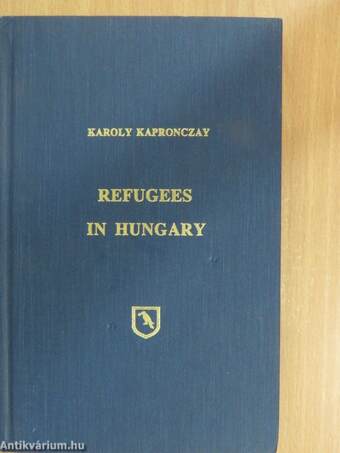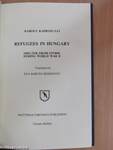1.067.308
kiadvánnyal nyújtjuk Magyarország legnagyobb antikvár könyv-kínálatát

VISSZA
A TETEJÉRE
JAVASLATOKÉszre-
vételek
Refugees in Hungary
Shelter from Storm During World War II
| Kiadó: | Matthias Corvinus Publishing |
|---|---|
| Kiadás helye: | Toronto |
| Kiadás éve: | |
| Kötés típusa: | Fűzött keménykötés |
| Oldalszám: | 248 oldal |
| Sorozatcím: | |
| Kötetszám: | |
| Nyelv: | Angol |
| Méret: | 22 cm x 15 cm |
| ISBN: | 1-882785-12-6 |
naponta értesítjük a beérkező friss
kiadványokról
naponta értesítjük a beérkező friss
kiadványokról
Előszó
Hungary is situated at the cross roads of Central Europe and its fate depends mostly on the immediate interests of the past and present great powers. For the past 11 centuries its shear existence... Tovább
Előszó
Hungary is situated at the cross roads of Central Europe and its fate depends mostly on the immediate interests of the past and present great powers. For the past 11 centuries its shear existence was constantly in the balance. From its greatness under the Renaissance king Matthias Corvinus in the 15th century, the road was downhill. Today on only one third of its former territory, with millions of Hungarians under foreign rule, Hungary by and large, still menaged to cling to medieval ideas of chivalry and devotion to help the innocents victims of despots and dictators.
Starting with the victimized and persecuted Hungarians under the new Czechoslovakian, Rumanian and Yugoslavian rulers right after WW I., continuing with thousands of our brethren chased out by Serbs from Vojvodina in 1935, hundreds of thousands of refugees and P.O.W."s of many nationalities found safe heaven on Hungárián soil during WW II.
Starting with thousands of Jews from Austria and Czechoslovakia, continuing with the great masses of Polish refugees, and with a lot of other nationalities, mostly French, Italian, Russian, Serb, Dutch, British etc. escapees from Germán P.O.W. camps and ended with American and British airmen shot down over the country. The epoch ended partially with the Germán military occupation of Hungary on the 19th day of March, 1944. Even after this date, most members of the Hungárián armed forces, authorities and civilians defied the Germán efforts of rounding up all foreigners on Hungárián soil. Thousands of refugees survived the hostilities and were repatriated after the war.
It should be emphasized, that the Hungárián governments of the period were under extreme pressure by the Germans to hand over the escapees, refugees and the POW's to them. Even governments under the Germán occupation resisted this constant demand to surrender these people, with various degree of success. Especially irksome was to the Germans, when with the tacit approval of the Hungárián government, tens of thousands of mostly Polish soldiers left the country to jóin the Allied Forces.
We are willing to compare our record of handling the refugees with the record of any European nation under Germán occupation or influence. Vissza
Tartalom
TABLE OF CONTENTS
Table of Contents 1
Synopsis 3
Inroduction 4
I. Hungárián Refugees from Transylvania,
the Northern and the Southern Regions 16
II. Polish refugees in Hungary during W.W. II
The last hours of peace 23
September 1939 28 The Polish government and the
organization of the resistance 33 The Hungárián government and the
Polish refugee problem in September 1939 37
The viewpoint of the Hungárián government 39 The Hungrian and Polish organizations
in care of refugees 58 The secret Polish political and military
organizations 63
Polish military institutions in the fali of 1939 67
Polish military structures in the spring of 1940 74
Evacuation 78
The social welfare of the Polish refugees 85
The Red Cross and the refugees 91
Education 97
Elementary schools 101
Schools for Polish Jews 105
High schools 107
University Students 112
The independent Polish health-care service 115
After the Germán occupation of Hungary 121
Attempts to form new organizations 128
The Arrow Cross Party comes to power 134
Going home - Spring 1945 137
Hungárián aristocracy and the refugee care 143
The Polish Catholic Church in Hungary 147
The Jewish refugees and their persecution 152
French soldiers 170
British prisoners of war in Hungary 186
Dutch military refugees 198 The British, Dutch, Polish and French officers
during the peace negotiations 204
Escaped Italian soldiers 208
Serb and Russian refugees 221
III. Documents, recollections, memoirs
229-248
Témakörök
- Idegennyelv > Idegennyelvű könyvek > Angol > Történelem > Európa története > Magyarország története
- Történelem > Idegennyelvű > Angol
- Történelem > Magyarország története és személyiségei > Magyarország a XX. században > II. világháború > Külpolitika
- Történelem > Politika > Külpolitika > Egyéb
- Történelem > Magyarország története és személyiségei > Átfogó művek, tanulmányok
- Történelem > Legújabb kor > II. világháború > Egyéb







